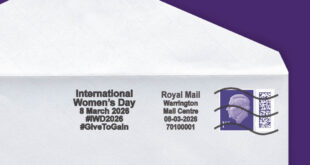© Provided by The i
Royal Mail has encouraged households and businesses to swap their old stamps for new barcoded version through its Stamp Swap Out scheme (Photo: Getty)
Royal Mail customers have accused the business of short-changing them for stamps they sent in to be swapped for barcoded replacements that never arrived.
The beleaguered postal service, which is already fighting fires on several fronts, is facing a new set of complaints from members of the public, with some claiming they did not receive fresh stamps after posting their old ones to the company as instructed.
Royal Mail is currently phasing out old “everyday” stamps and rolling out revamped versions featuring barcodes, which, the business said, will provide customers with “exciting new services by connecting physical stamps to the digital world”.
The ones being replaced are those that bear the image of Elizabeth II on a plain-coloured background. Special stamps with pictures on will continue to be valid and do not need to be swapped.
Originally, the cut-off date for posting mail with non-barcoded stamps was to be 31 January, 2023, but Royal Mail recently announced a “grace period” of six months, meaning post carrying the old stamps will be delivered as normal until 31 July, 2023.
After this date, post with a non-barcoded stamp will incur a surcharge.
Royal Mail has encouraged households and businesses to swap their old stamps for new barcoded version through its Stamp Swap Out scheme. Customers who wish to “swap out” their stamps should complete a form and send it back along with their non-barcoded stamps.
The postal service said it aimed to process applications within seven working days, and that the new stamps are sent by first-class mail. But some customers have reported long delays and questioned why their stamps have failed to arrive.
One frustrated customer who tried to contact Royal Mail via Twitter accused the firm of using the scheme as a “sneaky way to make money”, while another said she had been waiting since August for a new set of five first-class stamps, worth 95p each.
“We sent off our stamps to be replaced with the new ones [but] you have sent back completely different stamps to what we sent so we have to now buy extra postage to send large letters,” musician Sarah-Jane Morris said. She added that she suspected the scheme was “a sneaky way to make money”.
Another customer wrote just before Christmas: “I sent [five first-class] stamps back to you back in August…but I’ve not received my replacements yet.”
A third user claimed to have posted off “about 50 stamps” weeks ago and had “not seen anything in [the] way of replacements”.
Some have asked why the stamps need updating at all. According to Royal Mail, the addition of the barcodes will “facilitate operational efficiencies, enable the introduction of added security features and pave the way for innovative services for customers”.
Customers who wish to avail of these services will have to download the Royal Mail app, however, which will be a challenge for those without a smartphone.
Royal Mail said in a statement: “The vast majority of our customers have had a positive experience when using Royal Mail’s Swap Out scheme to change their non-barcoded stamps for barcoded stamps.
“The process of swapping out is free and we have tried to make it as easy as we can. There is no end date as to when customers are able to swap their non-barcoded stamps.”
Royal Mail has descended into chaos in recent months as it battles to stay afloat.
The company has repeatedly claimed since at least mid-2020 that Royal Mail’s UK business is losing £1m a day. Executives have publicised this figure as they attempted to justify staff cuts; shifting focus from the shrinking letters market to parcels; and a request to cut its legal obligation to deliver letters from six days a week to five. This plea was rejected in June by then business secretary, Kwasi Kwarteng.
More than 100,000 postal workers participated in strike action ahead of Christmas in a bitter dispute over pay, working conditions and job security.
The Communications Workers Union organised six days of strikes on 9, 11, 14, 15, 23 and 24 December, contributing to a huge backlog of letters, cards and parcels in the run-up to Christmas Day.



